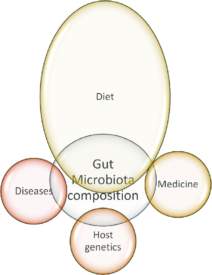Investigating the shared genetic effects between ADHD and unhealthy dietary intake
We have discussed the association between ADHD and obesity in our first blog (newbrainnutrition.com/adhd-and-obesity-does-one-cause-the-other/), briefly summarized, evidence from various study designs suggested that shared etiological factors might contribute to the above association. Recently, a large genome-wide association study (GWAS) on risk genes for ADHD reported a significant genetic correlation between ADHD and higher risk of overweight and obesity, increased BMI, and higher waist-to-hip ratio, which further supported that there could be genetic overlap between obesity and ADHD (1). Considering the previously described occurrence of unhealthy dietary intake in children and adolescents with ADHD in our second blog (newbrainnutrition.com/how-does-adhd-relate-to-unhealthy-dietary-habits-the-role-of-food-addiction/), along...
Attention-deficit/hyperactivity disorder (ADHD) and gut microbiota
Attention-deficit/hyperactivity disorder (ADHD) is a neurodevelopmental disorder with an estimated prevalence rate of 5.3% among children and of about 2.5% among adults. It is characterized by a persistent pattern of inattention and/or hyperactivity-impulsivity, being associated with significant impairment of social, academic, and occupational functioning across the lifespan. However, despite many efforts, the exact etiology of ADHD still remains unknown and data about modificable risk and protective factors are largely lacking. Recent evidence has suggested an association between inflammation, immunological disturbances and ADHD. Supporting this idea, an increased incidence of immune-mediated disorders (e.g. asthma, allergic rhinitis, atopic dermatitis, allergic conjunctivitis, psoriasis,...
Insulin resistance at a young age predicts metabolic problems later in life
The food choices we make, how much we exercise and the amount of body fat we have affects our health already at a young age. Although seemingly healthy, our metabolism might tell a different story. This can already be seen at a young age. The Estonian Children Personality Behaviour and Health Study (ECPBHS) started 20 years ago in 1998 and has since measured the participants’ body composition and assessed their metabolic abnormalities, such as insulin resistance and metabolic syndrome, at ages 15, 18, 25 and 33 years. Insulin resistance is a state in which the body does not respond to...
What is changing your gut microbiota?
Our body is colonized by trillions of microorganisms that are important for vital processes. Gut microbiota are the microorganisms living in the intestinal gut and play an essential role in digestion, vitamin synthesis and metabolism, among others. The mouth and the large intestine contain the vast majority of gut microbiota whether the stomach only contains few thousands of microorganisms, specially due to the acidity of its fluids. Microbiota composition is constantly changing, affecting the well-being and health of the individual. Each individual has a unique microbiota composition, and it depends on several factors including diet, diseases, medication and also the...
How Ambulatory Assessment can help to monitor what someone eats throughout the day
Whenever I ask my patients, if they are eating their “5 a day”, the immediate answer is “Yes, sure”. However, sometimes I´m not sure if their “Yes, sure” belongs to their real eating behavior or if it is more like a wishful thinking. This question applies for a broad range of behavior, like taking the stairs instead of the elevator, having enough sleep, walking the 10.000 steps a day etc.. But how can we be sure what people really do in their everyday life? The answer is: Ambulatory Assessment Ambulatory Assessment is the state of the art method for assessing...
The beneficial effects of “Dry January” (or any other month).
Dry January, a phenomenon that started in Scandinavia and has now gained more popularity in other parts of Europe. During “Dry January” people challenge themselves to temporary abstinence from alcohol for one month, in order to detox their bodies after the holiday season. The media states that one month alcohol abstinence has a beneficial effect on your sleep pattern, alertness, mood, weight, skin and your liver. Because I am currently participating in Dry January I was wondering if the results of alcohol abstinence for a short period of time are studied, and what these results might be. Before we can...
Sick, sad and stupid? – Why to avoid sugar, and how!
Every child knows: sugar is bad for the teeth. Nutrition with a high amount of sugar does not only put you at a risk of dental caries but also affects your physical and mental health, mood and memory. Sick? Current researches associate sugar consumption with overweight and obesity, which increases the risk of various subsequent illnesses: diabetes type 2, cardiovascular diseases (risk for stroke and heart attack), dementia and cancer. (1) Sad? In a study on patients with diabetes type 2 the level of blood sugar was manipulated. When the blood glucose was elevated (> 16,5 mmol/l) participants had a...
‘If two people eat the same, do they also have the same poop?’
Our microbiologist, dr. Clara Belzer answered this question from Noa (age 12) on Dutch national radio, and explained her research on gut-microbes and health. “Well the answer is yes and no”, starts Clara Belzer. So it’s a great question! Yes: feces gets to be more similar (both in looks and in smell) if you eat similar things. For instance eating corn or red beets gives a distinct colour to poop, and eating eggs a distinct smell. So what you eat directly influences your feces. At the same time, everyone’s excrements are unique. This is due to the unique assembly of...
Food choices and ADHD
We have talked before about how the ADHD has been associated with obesity and the mechanisms implicated on it. I will like to explain more about this important subject so you can understand what dietary changes you can make to avoid the risk of weight gain. Most of the authors attribute the presence of obesity on ADHD individuals to disorder eating patterns, especially overeating, that means that these people are eating a higher amount of calories per day in comparison of individuals without ADHD. When a person consumes more calories or food than their body needs they start to gaining...
Microbiota and social behavior: a possible treatment
Increasing evidences are showing that the gut microbiota can alter brain and behavior, and thus may play a role in the development of psychiatric and neurodevelopmental disorders, such as autism and schizophrenia. Animal models are a useful tool to study this mechanism. For example, germ-free (GF) mice, which have never been exposed to microorganisms, are usually compared to the exposed ones, known as conventional colonized mice (CC). Recent studies have reported that GF animals show increased response to stress, reduced anxiety and memory. In most cases, these alterations are restricted to males, in which there are higher incidence rates of...









